Craigslist scams targeting sellers and buyers aren’t rare, but you can avoid them by learning to recognize red flags and warning signs. In this guide, we’ll cover some of the most common scams on Craigslist sites and tips for keeping your money and identity safer.
1. Craigslist rental scams
In a rental scam, someone on Craigslist will list a property for rent to steal your money or your personal and financial information. Rental scammers may create listings for properties they don’t own or recreate legitimate listings with a different phone number or URL.
Signs to look out for:
- The property owner won’t let you see the property.
- They offer a “lease-free” option.
- The price is much lower than it should be.
- The owner asks for payment through a wire transfer or app.
What to do if you suspect this scam:
- Refuse to send money or personal information before seeing the property.
- Research property management companies in your area.
- Report scams to Craigslist, the police, your state’s attorney general, and the FTC.
2. Craigslist verification code scams
Craigslist text scams can start with the other party saying they want to confirm you aren’t a scammer. Don't give out any codes sent to your phone, especially if it says it’s for verifying your identity. The code is for a Google Voice account the scammer set up using your number.
Once the scammer has the code, they can use your number to scam other people. While you might not know what’s going on at first, you could start receiving messages from strangers, friends, and family members accusing you of trying to scam them. A Craigslist code scam could have long-term consequences that you don’t want to deal with, including potential problems with law enforcement.
Signs to look out for:
- A potential buyer asks you to provide them with a code to “confirm your identity.”
What to do if you suspect this scam:
- Do not give this person the code.
- Change your passwords and secure your accounts.
- Report the scammer to Craigslist and the authorities.
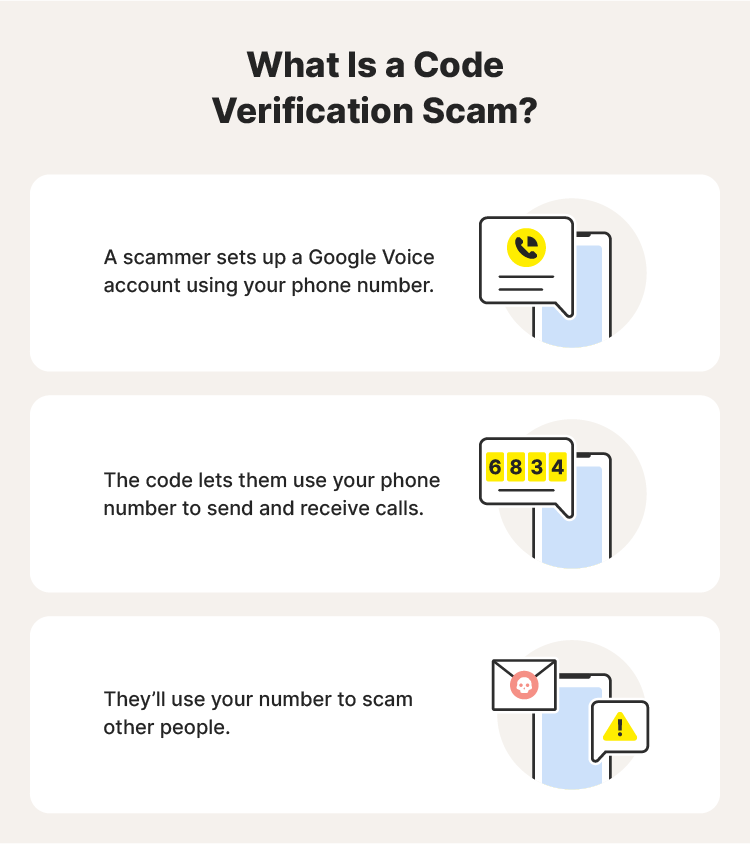
3. Ticket scams
A ticket scam is when someone sells fake or nonexistent tickets to a game, concert, or event. Scammers like to use Craigslist for concert scams because it has a large user base and is a fast and easy way to buy tickets from someone in your area.
The problem is that Craigslist doesn’t offer a way to pay for items on the site, meaning you have less protection if you get scammed. You can avoid this Craigslist buyer scam by using authorized resellers or contacting the venue for tickets directly.
Signs to look out for:
- Tickets are for sold-out events.
- The ticket price is too low.
- The same ad is listed on multiple city or state Craigslists.
- The seller is very pushy about you buying the tickets.
- The seller asks you to pay using a wire transfer or cryptocurrency.
What to do if you suspect this scam:
- Request that the seller use an authorized ticket reselling platform.
- Ask for photos of the tickets.
- Ask for the barcode number to verify authenticity with the issuer.
- Ask the seller to meet in person.
- Report the seller to Craigslist and the authorities.
4. Pet scams
Scammers will try to sell you anything — even fake pets. In a pet scam, a scammer will list animals for sale on Craigslist, sometimes claiming they’re a breeder. Other times, they’ll say they’re trying to rehome an animal because they’re moving or unable to care for it.
It becomes a scam when they advertise animals that don’t exist and take your money.
Signs to look out for:
- The seller won’t let you meet the animal in person.
- The seller is asking too little for the animal.
- The same ad is on multiple platforms or Craigslist areas.
- There are no pictures or the pictures are unclear.
What to do if you suspect this scam:
- Ask to meet the animal before you pay.
- Only pay in person.
- Do a reverse image search.
- Report the seller to Craigslist and the authorities.
5. Cashier check scams
Craigslist check scams are really easy to see and avoid: a buyer offers to send you a cashier’s check to pay for something, but they want you to send it before the payment arrives. If you do send it, the check will either never arrive, or it’ll be fake.
While it might seem difficult to fake a cashier’s check, it’s actually pretty easy. If the seller wants to pay by check, tell them the item won’t be shipped until the payment clears. Don’t be surprised if they get pushy or back out of the sale — it probably means that they were trying to commit check fraud.
Signs to look out for:
- The buyer says they are in a different area and will send a check.
- The buyer asks you to ship the item before you receive payment.
What to do if you suspect this scam:
- Don’t send anything before payment is received and cleared.
- Report the scammer to Craigslist and the authorities.
6. Overpayment scams
An overpayment scam doesn’t seem like a scam at first: a buyer contacts you saying they can send you money right away for whatever you’re selling, only they send more than you asked for. They’ll quickly realize their mistake and ask you to refund the overage.
If this person paid by check, they’ll ask you to refund the overage using PayPal or a wire transfer. If they paid using a digital wallet, they’ll ask you to return the money using a different method.
But once you return the overage, they’ll cancel the original payment, meaning you’re out the cost of the overage and the item you sold. It could turn out that the check they used to pay you is false, too.
Signs to look out for:
- Someone overpays you when buying something.
- They ask for a refund on the overage right away.
- They ask for a refund in a different form from the original payment.
What to do if you suspect this scam:
- Wait for the full overpayment amount to clear your bank account before sending the item and refunding any overpayment.
- Report the buyer to Craigslist and the authorities if the payment was fraudulent and they have your item.
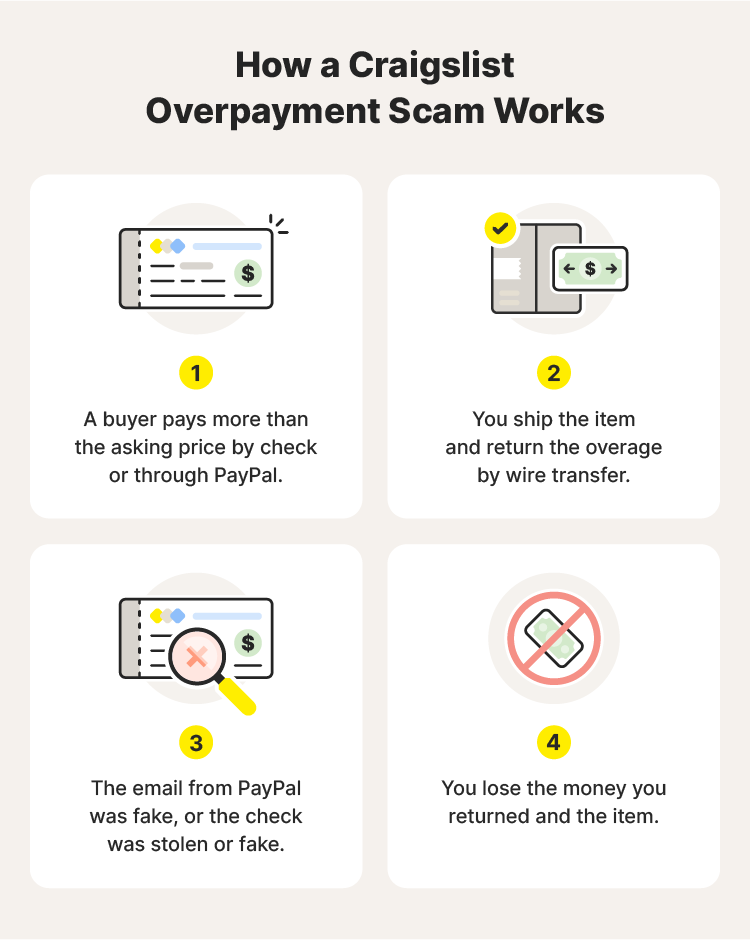
7. Craigslist guarantee scams
As a way of getting you to let your guard down, scammers posing as sellers on Craigslist may say that they are a “Guaranteed Seller” on Craigslist. They may even have some high-quality images on their listing or send you an email that looks like it came directly from Craigslist.
But Craigslist offers no such certifications or guarantees to anyone. This is a scam.
Signs to look out for:
- “Trust” badges on listings and emailed “proof” of guaranteed status from Craigslist.
What to do if you suspect this scam:
- Don’t buy anything from these listings.
- Don’t click on links in the listings or emails the seller sends.
- Report the seller to Craigslist.
8. Car sales scams
Buying a car can be complicated, and people may assume that using Craigslist to buy a car is easier because they don’t have to deal with high-pressure salespeople or auto loans. But that doesn’t mean you can let your guard down.
Some signs of a car sale scam include sellers hiding damage, creating fake listings, pricing a vehicle too low, or offering fake vehicle history reports to close a sale.
Signs to look out for:
- The seller doesn’t want to meet in person.
- You find the same pictures on multiple listings.
- The seller is acting as a middleman.
- The price is too good to be true.
What to do if you suspect this scam:
- Don’t send money without seeing and driving the car.
- Don’t sign the title to a vehicle until a buyer’s payment clears.
- Report scams to Craigslist and the authorities.
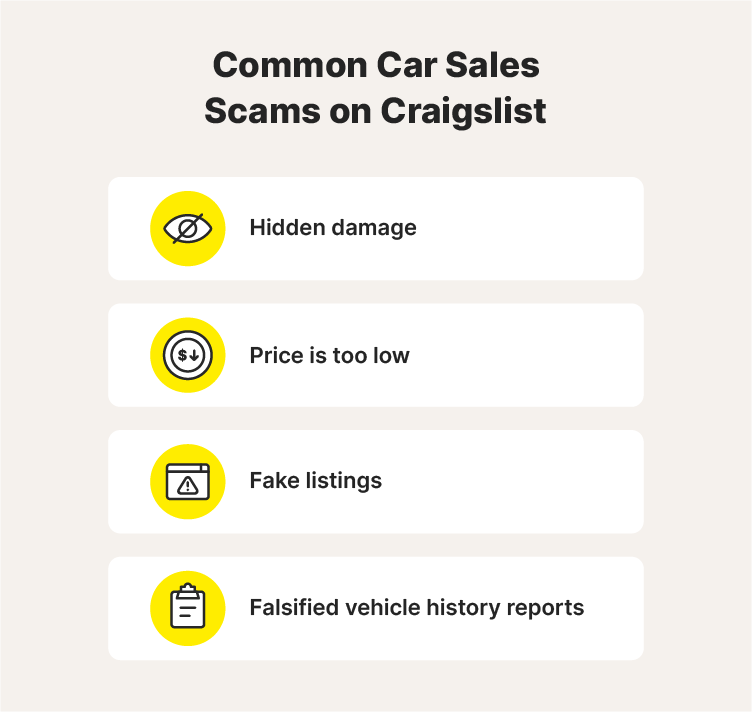
9. Travel scams
Even though security measures make it more difficult to transfer plane tickets and other types of travel documents, some scammers will try to take advantage of your desire to see the world. Fake ticket wholesalers and travel companies will offer deals that are way below what you’ve seen on other sites, even discount travel sites. While some people may believe sites like booking.com aren’t legitimate, these travel site scammers are often much more dangerous. If it looks too good to be true, it probably is.
Signs to look out for:
- Sellers offering trips at a much lower price than normal.
- Scammers demanding an upfront deposit.
- A travel company’s website looks cheap and has spelling errors or missing contact information.
What to do if you suspect this scam:
- Don’t buy your tickets from any source that requires you to use a wire transfer, cash, or cryptocurrency.
- Report the seller to Craigslist and the authorities.
10. Escrow scams
Because most people know that scams can happen on Craigslist, the scammers have adapted. When buying or selling, some scammers say that all of their transactions must go through an escrow company to protect them. They also point out that you’re protected by these kinds of arrangements.
But the reality is that these scammers set up fake escrow companies or accounts to steal your money or build fake sites designed to capture your personal information.
If anyone on Craigslist says they want to use an escrow company, research them on your own and offer an alternative you know is legitimate. If the other person doesn’t like it, they can choose to sell to someone else.
Signs to look out for:
- A buyer or seller says they only deal with a specific escrow company.
- They send you a direct link to an escrow company.
What to do if you suspect this scam:
- Research the proposed escrow company (and alternatives).
- Suggest a different, legitimate company.
- Report the seller to Craigslist if they are linking to fake companies.
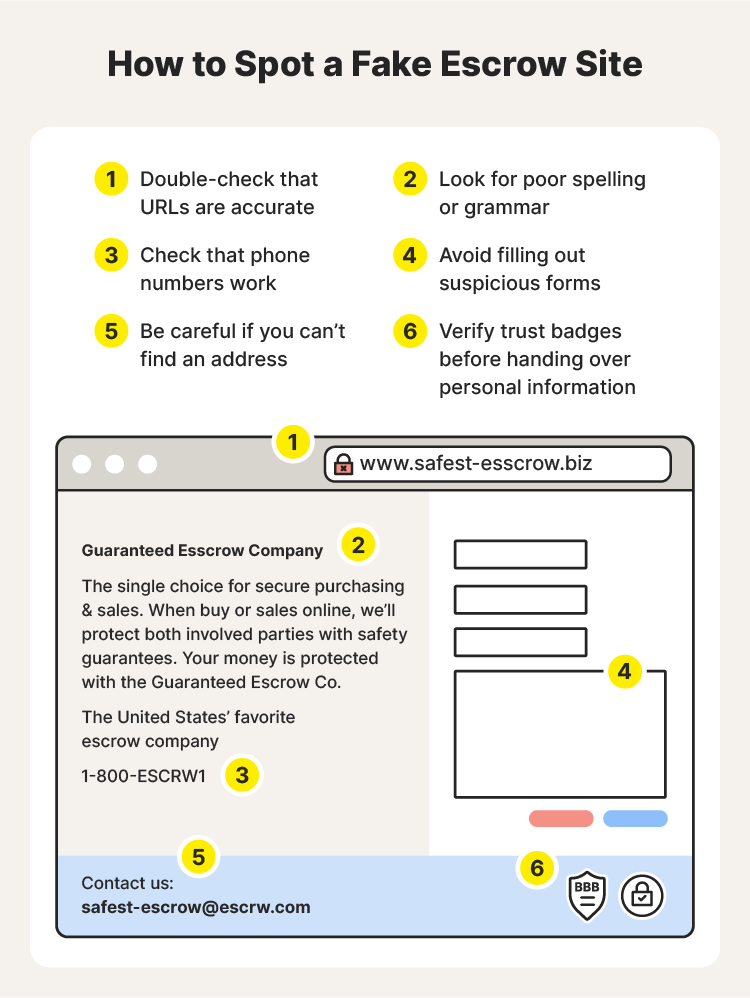
11. Employment scams
Finding your dream job on Craigslist is possible, but don’t let your enthusiasm for a new position blind you to employment-related fraud and job scams.
Signs to look out for:
- The job listing is copied from another site with the company name changed.
- There’s no contact information, no location, or few concrete job details.
- The listing is poorly written or contradictory.
- The listing is for a government job.
- Salary information is much higher than comparable jobs.
What to do if you suspect this scam:
- Visit the company’s site directly to verify job openings.
- Don’t click on links in the listing or communications with people on Craigslist.
- Report scammers to Craigslist.
12. Overseas sellers scams
If you’re browsing Craigslist and you find something you want at a really good price, but the listing says that the seller is living overseas, it’s more than likely a scam. Whether the seller claims to be deployed in the military or a student studying in another country, they’re trying to get people to send them money for items that don’t exist.
The seller will claim that they need to get rid of their stuff while they’re overseas or that they need to sell it quickly to avoid another month of storage fees, hence the low price. But they’ll eventually tell you that you can’t see anything in person and that you’ll need to send money using a wire transfer or other untraceable method.
Signs to look out for:
- The seller says they are overseas.
- The seller doesn’t let you see an item before paying.
- They are selling something for much less than it’s worth.
- They ask for payment using a wire transfer.
What to do if you suspect this scam:
- Don’t buy the item.
- Report the seller to Craigslist and the authorities.
13. Middleman scams
In a middleman scam, a seller on Craigslist will have something listed for sale, but once you start talking with them, they reveal that they’re selling it on behalf of someone else. This is a big red flag.
Not only could it mean that this person is selling stolen property, but it could also mean that they want to accept your payment and then send you somewhere to pick up an item only to find out there was never anything for sale.
Signs to look out for:
- The seller says that an item isn’t theirs.
- They request payment using a method like a wire transfer that is difficult to dispute.
- The seller won’t let you see what you’re buying before you send money.
What to do if you suspect this scam:
- Don’t send them money.
- Report this kind of wire transfer scam to Craigslist and the authorities (especially if you paid and didn’t receive what you bought).
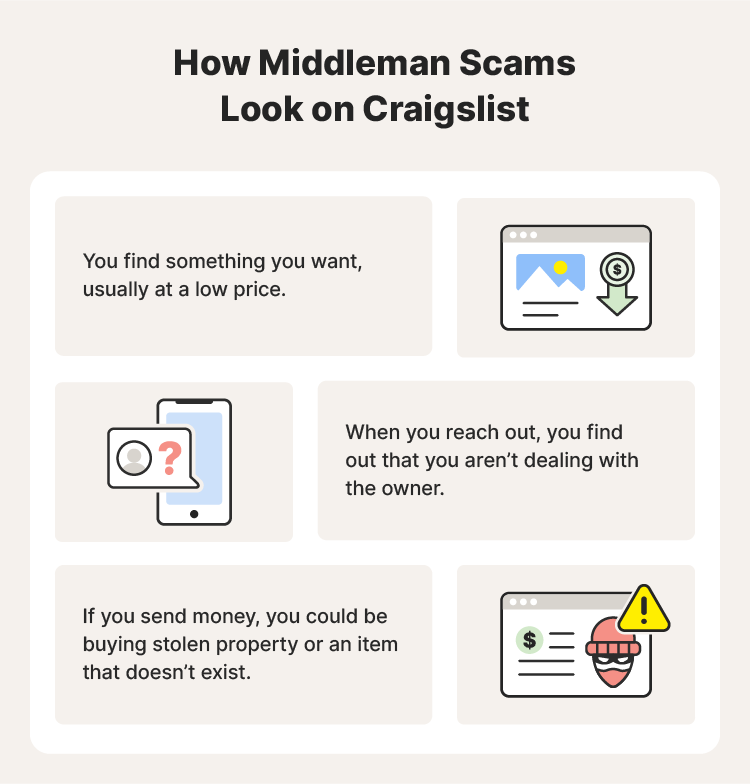
How to avoid scams on Craigslist: 7 tips
Safer online shopping is possible using Craigslist as long as you know what to look for. Keep reading to find out how you can reduce your risks, and remember to trust your instincts.
1. Meet in person
Meeting a buyer or seller in person can reduce the risk of falling for a scam on Craigslist for several reasons. First, you’ll be able to see the item you’re trying to buy (and examine it to make sure it’s in good condition). Second, you’ll see if the other party is serious about the transaction. If they try to get out of it, it could mean they’re a scammer.
2. Use secure payment methods
When making payments for things you buy on Craigslist, it’s best to use secure and well-established payment methods. Digital wallets are usually safe and have buyer and seller protections in place in the event of fraud or theft. It also puts an extra layer between your account numbers and a scammer.
If you’re meeting the other party in person, cash can be okay, but make sure you’re completing the transaction in a safe, public place.
3. Verify the product or service
If you’re spending your hard-earned money on something, you have the right to ask as many questions as you want and to request additional information, photos, or forms of verification.
The best way to get those answers and check an item's condition is to see it in real life. If the seller refuses, start looking somewhere else.
4. Protect personal information
There are very few transactions using Craigslist that require you to disclose your personally identifiable information. Don’t share your home address, bank account details, or Social Security number with strangers on Craigslist, no matter how convincing an argument they try to make.
5. Use Craigslist's email relay
Craigslist email relay hides your email address when communicating with buyers or sellers. It’s a great security feature that you should take advantage of. That means you shouldn’t give your real email address or phone number to someone you’re dealing with, especially if they’re pressuring you.
6. Recognize red flags
Prices that seem too good to be true, sellers who try to pressure you into making quick decisions, vague listings, communications that feel suspicious, or duplicated listings are all red flags that you may be dealing with a scammer. If something feels off, trust your instincts and proceed with caution.
7. Report scammers
One of the most effective ways to reduce the chances of being scammed is by reporting scammers on Craigslist. By reporting them to Craigslist (and the authorities, if necessary), you’re helping the platform weed out potential bad actors before they try to contact you or list their fake goods and services.
Help protect your information and identity online
Buying and selling safely is easier when you know that your devices and personal information are safe. LifeLock provides you with identity theft alerts that keep you informed about potentially fraudulent uses of your identity.
LifeLock also makes monitoring your credit reports easier. We can help you secure your identity if you lose your wallet by helping you cancel credit cards and replace Social Security cards and IDs.
FAQs about Craigslist scams
Still have some questions about how to avoid Craigslist scams and protect your personal information? We have answers.
What can a Craigslist scammer do with my phone number?
If a Craigslist scammer has your phone number and gets you to verify a code sent to that number, they can use it to open a Google Voice account. With that account, they can continue running scams using your phone number.
How do I know if a Craigslist job is legit?
While there’s no way to be 100% certain that a job listing is real, look at the details for a clearer picture. Real job listings usually have:
- Salary information in line with industry standards
- A location listed
- Specific details about the responsibilities of the position
- The name of the hiring company
- Correct spelling and grammar
Is it safe to give my address on Craigslist?
It’s probably not a good idea. Sharing personal information, even something as simple as an address or phone number, could provide a scammer with a piece of information that they need to steal your identity. Whether you’re selling something on Craiglist or another resale platform like Facebook Marketplace, try to meet in a safe, public place.
Is Zelle safe for Craigslist?
It can be. Zelle makes sending payments fast, but they may not refund you if you’re scammed on Zelle while trying to buy something on Craigslist.
Editor’s note: Our articles provide educational information. LifeLock offerings may not cover or protect against every type of crime, fraud, or threat we write about.
This article contains
- 1. Craigslist rental scams
- 2. Craigslist verification code scams
- 3. Ticket scams
- 4. Pet scams
- 5. Cashier check scams
- 6. Overpayment scams
- 7. Craigslist guarantee scams
- 8. Car sales scams
- 9. Travel scams
- 10. Escrow scams
- 11. Employment scams
- 12. Overseas sellers scams
- 13. Middleman scams
- How to avoid scams on Craigslist: 7 tips
- Help protect your information and identity online
- FAQs about Craigslist scams
Start your protection,
enroll in minutes.
LifeLock is part of Gen – a global company with a family of trusted brands.
Copyright © 2026 Gen Digital Inc. All rights reserved. Gen trademarks or registered trademarks are property of Gen Digital Inc. or its affiliates. Firefox is a trademark of Mozilla Foundation. Android, Google Chrome, Google Play and the Google Play logo are trademarks of Google, LLC. Mac, iPhone, iPad, Apple and the Apple logo are trademarks of Apple Inc., registered in the U.S. and other countries. App Store is a service mark of Apple Inc. Alexa and all related logos are trademarks of Amazon.com, Inc. or its affiliates. Microsoft and the Window logo are trademarks of Microsoft Corporation in the U.S. and other countries. The Android robot is reproduced or modified from work created and shared by Google and used according to terms described in the Creative Commons 3.0 Attribution License. Other names may be trademarks of their respective owners.





